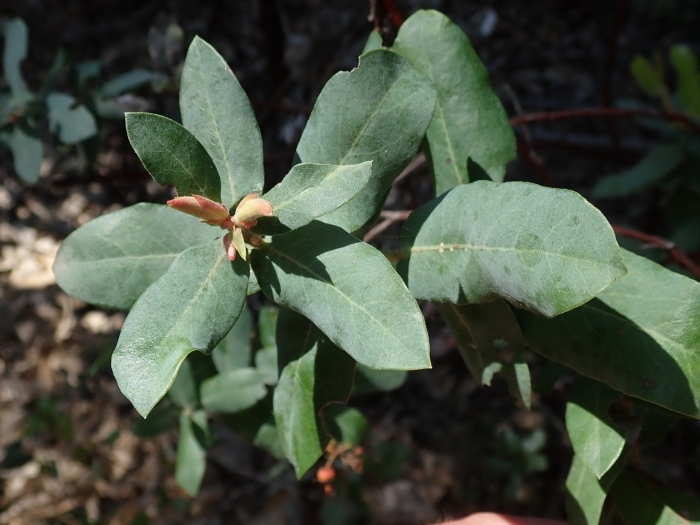Santa Cruz Manzanita
(Arctostaphylos andersonii)
Santa Cruz Manzanita (Arctostaphylos andersonii)
/
/

joergmlpts
CC BY 4.0
Image By:
joergmlpts
Recorded By:
Copyright:
CC BY 4.0
Copyright Notice:
Photo by: joergmlpts | License Type: CC BY 4.0 | License URL: http://creativecommons.org/licenses/by/4.0/ | Rights Holder: joergmlpts | Publisher: iNaturalist | Date Created: 2022-05-04T18:13:43Z |























Estimated Native Range
Summary
Arctostaphylos andersonii, commonly known as Santa Cruz Manzanita, is an evergreen shrub native to the chaparral and mixed evergreen forests of the Santa Cruz Mountains in California. It typically inhabits open, sunny spots within these ecosystems, often on sandy or rocky soils. This species is adapted to elevations up to 2297 feet. Santa Cruz Manzanita can reach heights of 7-16 feet with a similar spread, and it is characterized by its smooth red bark, twisted branches, and dense foliage of serrated, lobed, glaucous leaves. From February through May, it produces urn-shaped, pink to white flowers that are attractive to pollinators, followed by small, sticky fruits that are enjoyed by local wildlife.
Santa Cruz Manzanita is valued for its ornamental qualities, including its picturesque form, attractive bark, and showy flowers. It is used in native plant gardens, as a focal point in landscape design, and for habitat restoration projects. It requires little maintenance once established, thriving in well-drained soils and tolerating drought conditions. Full sun is preferred for optimal growth and flowering. Gardeners should be aware that this plant can be susceptible to fungal diseases, particularly in poorly drained soils. It is also important to avoid overwatering to prevent root rot.CC BY-SA 4.0
Santa Cruz Manzanita is valued for its ornamental qualities, including its picturesque form, attractive bark, and showy flowers. It is used in native plant gardens, as a focal point in landscape design, and for habitat restoration projects. It requires little maintenance once established, thriving in well-drained soils and tolerating drought conditions. Full sun is preferred for optimal growth and flowering. Gardeners should be aware that this plant can be susceptible to fungal diseases, particularly in poorly drained soils. It is also important to avoid overwatering to prevent root rot.CC BY-SA 4.0
Plant Description
- Plant Type: Shrub
- Height: 6-12 feet
- Width: 6-10 feet
- Growth Rate: Moderate
- Flower Color: Pink, White
- Flowering Season: Spring, Fall, Winter
- Leaf Retention: Evergreen
Growth Requirements
- Sun: Full Sun, Part Shade
- Water: Low
- Drainage: Medium, Fast
Common Uses
Bee Garden, Bird Garden, Drought Tolerant, Low Maintenance
Natural Habitat
Native to chaparral and mixed evergreen forests within the Santa Cruz Mountains up to 2297 feet elevation
Other Names
Common Names: Anderson’s Manzanita
Scientific Names: , Arctostaphylos andersonii, Arctostaphylos andersonii var. andersonii, Arctostaphylos andersonii var. pajaroensis, Arctostaphylos andersonii var. pajaroensis, Uva-ursi andersonii,
GBIF Accepted Name: